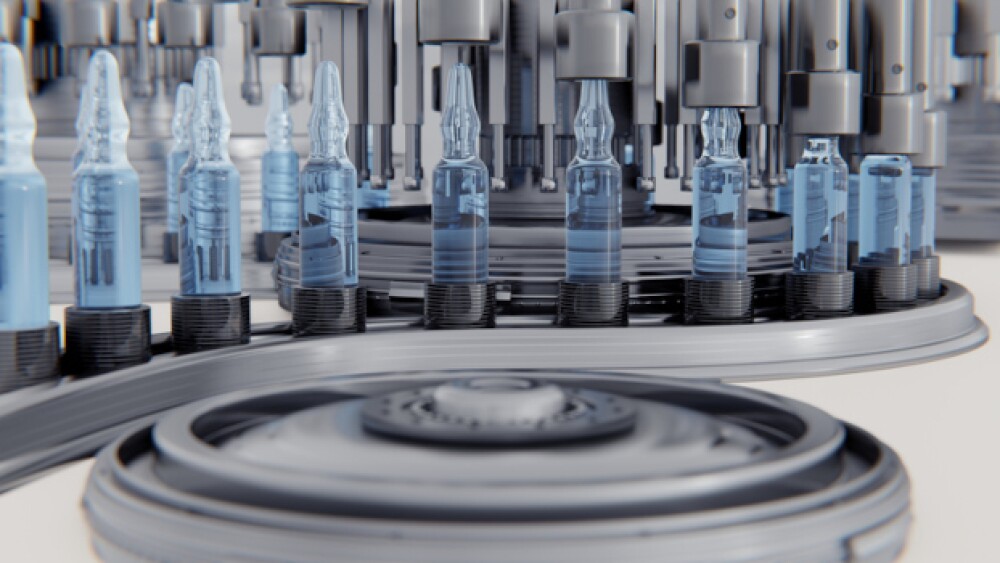Companies are moving from using AI for distinct operations to applying the technology for control and optimization of the whole production process.
Artificial intelligence is already an established part of biopharma manufacturing. Machine learning tools are in use at sites around the world and, companies say, are driving significant improvements in output and efficiency. Yet the relatively short history of AI use in drug production and the pace of technological development suggests the industry is still in the early phases of a digital transformation.
Companies are applying AI to a range of tasks across the drug production process. Going beyond the data logging and retrospective analysis capabilities of older computational technologies, manufacturers are pursuing near-term AI uses such as spotting patterns in large datasets. In the longer term, company leaders envision the use of AI expanding to cover the end-to-end process and to increasingly interact with hardware.
Fully Automated
Ultimately, AI advocates envisage the technology altering almost every aspect of drug production. Nicole Murphy, head of pharmaceutical operations and technology at Biogen, told BioSpace the goal is to achieve “end-to-end integrated process control” and “fully automated fill-finish operations.”
Similarly, end-to-end process optimization is one of Sanofi’s long-term objectives for AI, a spokesperson for the French drugmaker told BioSpace. The plan, they added, is to “simulate and optimize entire production lines, leading to significant improvements in efficiency and quality.”
The shift from applying AI to distinct activities to using the technology to oversee and improve the whole production process is part of a broader ratcheting up of the industry’s ambitions. Sanofi’s AI to-do list includes using internal and external data to anticipate and mitigate quality and compliance risks. That long-term project will build on the company’s existing quality management tools.
Sanofi also sees a growing role for AI in fortifying its supply chain. The company’s AI systems “are already predicting and mitigating a huge amount of potential shortages,” the spokesperson said. In the longer term, Sanofi is working toward “a fully integrated, AI-driven supply chain that can adapt in real time to changes in demand or disruptions.”
Such real-time adaptability is also part of the AI roadmap at Moderna. Joe Margarones, head of digital individualized neoantigen therapies at the company, told BioSpace that its biggest longer-term opportunities for AI include real-time monitoring of anomalies to help enable rapid response.
Margarones cited AI-powered decision support as another promising long-term use for AI. Namely, he said, “AI could help summarize, correlate and recommend actions based on fault data”—that is, information about deviations from standard operating conditions.
An additional broad, longer-term goal for AI at Sanofi is to boost sustainability. The company spokesperson said the benefits of using AI to optimize processes will play “a crucial role in helping us achieve our sustainability goals.”
AI Meets Robotics
Other groups are looking at the intersection between AI software and robotic hardware.
“I’m always trying to promote new technology and advances in manufacturing,” said Michael Paglia, chief technology officer at ElevateBio BaseCamp, a service provider that specializes in cell and gene therapies.
Paglia reeled off a far-reaching list of projects at third-party technology providers that included work to “move a robot around a room to truly solve the problem of scale.” With labor accounting for half the cost of autologous CAR T therapy manufacturing, there is interest in using robots to manipulate instruments and materials such as incubators, bioreactors and reagent bags to save money and reduce variability. AI is being used to help robots move through facilities more efficiently, Paglia said.
Working with the University of Pittsburgh, ElevateBio is setting up a production facility with gene editing, induced pluripotent stem cell and cell, vector and protein engineering capabilities next to Carnegie Mellon University’s Manufacturing Futures Institute. The Carnegie Mellon institute focuses on manufacturing innovation, including the development of robots capable of moving through production facilities.
Aspects of cell and gene therapy production remain relatively hands-on compared to production of other modalities, and Don Fink, a regulatory expert at Dark Horse Consulting, said that cell and gene therapies could particularly benefit from AI-enabled automation.
Taking a “hands-on, less automated approach leaves more opportunities for errors, deviations and inconsistencies,” Fink told BioSpace. Automating manufacturing through a mix of hardware and software could mitigate this variability, enabling facilities to “drive the same process over and over and over again.”
As AI becomes more integral to manufacturing operations, companies have warned investors in financial regulatory disclosures that they could expose themselves to risks such as system failures, shutdowns and cybersecurity threats. Not wanting to lose ground to rivals, manufacturers are forging ahead with the rollout of AI nonetheless, banking on the potential benefits outweighing the possible downsides.






